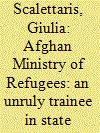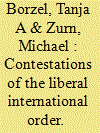| Srl | Item |
| 1 |
ID:
173911


|
|
|
|
|
| Summary/Abstract |
This article looks at the interactions between the officials of the United Nations High Commissioner for Refugees (UNHCR)’s mission in Afghanistan and the heads of the Afghan Ministry of Refugees in the mid-2000s. It examines the rationales that guide officials at both the UNHCR and the ministry, as a way of unpacking the politics of state capacity building in post-2001 Afghanistan. The first section looks at the tense relationship between the two bodies from the point of view of UN officials, who strive to redress a ministry portrayed as ‘incapable’. By looking in turn at the fundaments of the political legitimacy of the Afghan state, at how international intervention transforms the Afghan political arena, and at Afghanistan’s position in global power relations, the following sections identify three rationales that can be ascribed to ministry officials, namely reconciling internal and external state legitimacy, strategic resource tapping and resistance to inter-state hegemony. From its standpoint at the juncture between an ‘external’ and a ‘local’ institution, the article ultimately stresses the importance of gaining epistemological distance from the peace building project in order to consider ‘local’ actors as full political actors.
|
|
|
|
|
|
|
|
|
|
|
|
|
|
|
|
| 2 |
ID:
178552


|
|
|
|
|
| Summary/Abstract |
The 1990s saw a systemic shift from the liberal post–World War II international order of liberal multilateralism (LIO I) to a post–Cold War international order of postnational liberalism (LIO II). LIO II has not been only rule-based but has openly pursued a liberal social purpose with a significant amount of authority beyond the nation-state. While postnational liberal institutions helped increase overall well-being globally, they were criticized for using double standards and institutionalizing state inequality. We argue that these institutional features of the postnational LIO II led to legitimation problems, which explain both the current wave of contestations and the strategies chosen by different contestants. We develop our argument first by mapping the growing liberal intrusiveness of international institutions. Second, we demonstrate the increased level and variety of contestations in international security and international refugee law. We show that increased liberal intrusiveness has led to a variety of contestation strategies, the choice of which is affected by the preference of a contestant regarding postnational liberalism and its power within the contested institution.
|
|
|
|
|
|
|
|
|
|
|
|
|
|
|
|
| 3 |
ID:
072912


|
|
|
|
|
| Publication |
2006.
|
| Summary/Abstract |
This article charts the response of Southeast Asian states to the Indochinese refugee crisis between 1975 and the 1979 Geneva conference. The purpose of this article is to understand why the outbreak of Southeast Asia's largest refugee crisis since World War II did not prompt the region's states to accede to international refugee law. It is argued that most Southeast Asian states continued to reject international refugee law during this period because they believed that their interests were best served by this policy. That is, Southeast Asian states conducted a form of 'refugee manipulation' because their persistent refusal to sign the instruments compelled Western states (the United States in particular) to provide material assistance to the refugees and offer resettlement places. Thus, the Southeast Asian states' strategy placed the onus for responding to the crisis on international institutions and Western states. Furthermore, many Southeast Asian states justified their refusal to sign the instruments by referring to the latter's Eurocentric character. Ultimately, this argument allowed many of the region's states to absolve themselves of responsibility for taking the lead in responding to the crisis.
|
|
|
|
|
|
|
|
|
|
|
|
|
|
|
|